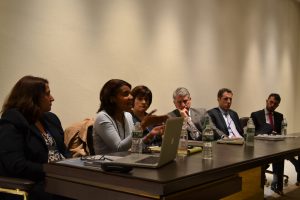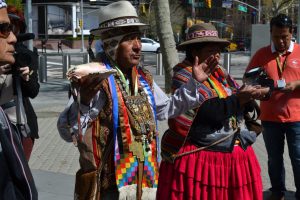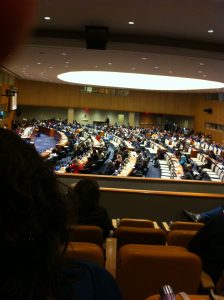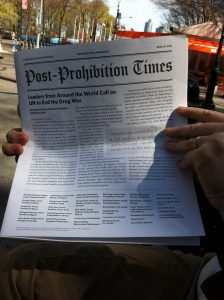Overall, the UNGASS was a fantastic networking opportunity and learning experience. I ran into several colleagues and friends from Europe and the Americas who I haven’t seen in years. One in particular who I ran into at the UN is Paul Griffiths. Paul is the Scientific Director for the European Monitoring Center on Drugs and Drug Addiction, which is basically the European Union’s equivalent of our National Institute on Drug Abuse and the Office of National Drug Control Policy rolled into one…
EMCDDA is doing a lot of great research, and their statistical reports are thorough and useful – which is sadly no longer the case for the US agencies. The reports from US agencies like SAMHSA, NIDA, CDC, and the BJS over the past decade have been getting fewer and farther between, dumbed down, and less useful. Paul and I were both scratching our heads over this. The EU used to look to the US as an example of good data reporting, but in the past 10 years, the situation has reversed.
Some of the groups there in NYC took advantage of the interest and the large numbers of people to stage events, like the @Stop_The_Harm / @OpenSociety Museum of Drug Policy. There were also several terrific, informative panel discussions relating to human rights, sentencing reform, and other topics. I attended one of those, on drug policy and sentencing reform, at the Ford Foundation one morning.

Panel on sentencing reform and drug policy, April 20, 2016
And of course there were demonstrations including the 420 demo on 4/20, the Bicycle Day Demo, a coca ceremony that focused on the rights of indigenous people, and a memorial ceremony for a good friend and colleague Joep Oemen.

Coca ceremony and demonstration outside UN headquarters
I was able to promote/socialize the
Drug War Facts website to folks from around the world. I’ve also invited some of them to review our international sections and give me some feedback. I’m going to promote the international sections more strongly over the next few months. We’ve already seen some good growth in visits from regions outside the US, and I think there’s potential for more.
As to the UNGASS itself, the UN meeting – it was an opportunity for a handful of nations to stand up and speak out for reform in an international forum, in defiance of the international drug control apparatus. So Mexico, Canada, Bolivia, Jamaica, and several other nations are absolutely to be praised and commended. Much of the video is available at
webtv.un.org, just search on “drugs” or “ungass” and then sort by date. Some of it is very much worth hearing.
There’s a lot of material and opportunities from those three days that drug policy reformers will be able to use for years to come in order to advance the debate. And the opportunities for networking, once again, were terrific. There are lots of people interested in drug policies, and the more opportunities there are for people to get together and discuss these issues the better.
Having said all that, the UNGASS itself, the UN meeting part of it, was, in the words of Shakespeare, “a tale told by an idiot, full of sound and fury, signifying nothing.”

UN General Assembly – the view from the cheap seats
The General Assembly adopted the outcome document for the UNGASS – by acclamation, no dissent allowed, no debate allowed – at the start of the first day, the document itself was prepared at the annual meeting of the Commission on Narcotic Drugs in Vienna back in March. (Those meetings you will *not* find online, by the way. The UN does not make an archive of CND meetings available. The only existing public record are videos shot by HCLU/DrugReporter; a summary of speeches on CNDBlog; and the audio recordings of the first three days that I make each year, the event is webcast live so by staying up from 2am til 10am for three days in mid-March I preserve the English-language audio.)
The GA discouraged member-states from calling for revision of the international drug control treaties. Instead, the outcome document – which I still think an odd name for something that’s been decided at the beginning of an event – reaffirms the commitment of member states to uphold the treaties. Still, as I mentioned, several member states – like Canada, Mexico, and some others – expressed their commitment to pursuing alternatives, and underscored the need for a different approach. On the other hand, other member states, particularly Russia, Singapore, Indonesia, China, and Iran spoke out against reform, against legalization, against decriminalization, against harm reduction, and in favor of their rights to torture and kill their own citizens in the name of drug war. The US and its “flexible” interpretation, meanwhile, can be seen to approve anything.
Here is the outcome document:
It’s possible that some of our colleagues who have put a lot of time, effort, money, and airmiles into this process over the past few years will disagree. Or, possibly not. Perhaps I should be less cynical, the side events may have had some impact on the delegates. It’s like Peter Schickele once said, ideas are like pollen – once they’re in the air, you never know who’s going to sneeze.
I should emphasize, I do think it is very important for civil society/NGO people to attend the Commission on Narcotic Drugs in Vienna, arguably more important than being at this thing. The CND meets ever year. They have softened in the last decade, and while some of that is simply because nations are moving toward reform, I believe that part of it is because of interaction with reformers during the meetings. The interactions between civil society people is also important. Reformers have a lot of common ground and common interests with the NGOs whose focus is prevention, treatment, and harm reduction. We can build a lot of very important bridges, but only by being there at these meetings. The other side’s people – drug warriors like Kevin Sabet, Sue Rusche, and David Evans – are always there, which means that if we’re not, then the world will only see the US prohibitionists.

David G. Evans from New Jersey, along with Sue Rusche, Kevin Sabet, and other drug war zealots are regular attendees at these UN drug meetings. Here’s David leaving the UN on the 20th. His route took him through the 420 marijuana legalization rally.
That’s why I think it is important that there are pro-reform NGOs in attendance at the CND in Vienna each year. The fact that there’s no archive of the videos from the CND meetings is just galling to me, but it’s not just about witnessing these events (and HCLU does a great job but they are only two of them and there’s a lot to cover and many people to interview). The outcome document was decided in Vienna, that’s where the drug policy apparatus is headquartered.
NGOs have made much greater inroads in Vienna. The NGOs in New York were still being treated like a nuisance – there were continual snafus regarding credentials of NGO attendees, particularly the youth; UN security wouldn’t let me bring recording equipment inside because I only had an NGO pass (yet they had no problems with my camera, which can shoot limited video, or my cel phone, which can record sound and video, and I saw other video cameras, iPads, etc inside); t-shirts with political messages weren’t allowed to be worn in; and security confiscated copies of a flyer called the Post Prohibition Times from attendees as they were entering (that flyer was a the sign-on letter that DPA coordinated with a 1,000 world leaders and famous people as signatories). We were better received in Vienna even back in 2008 than we were at this thing in NYC, as far as I could tell.

A copy of The Prohibition Times. UN Security seized these from people who were openly carrying copies when they tried to enter the UN grounds.
I think it’s important for youth to be represented, and the current executive director of
SSDP, Betty Aldworth, is an excellent representative. She previously worked for the National Cannabis Industry Association, which gave her a lot of good contacts. Fortunately she is not a marijuana-only sort of person. She actually came out of harm reduction before that. She has a great understanding and appreciation of drug policy reform as a whole. She’s the best director they’ve had in a very long time.
I also think that Neill Franklin is a great leader, an excellent representative of drug policy reform and of his organization
LEAP [Law Enforcers Against Prohibition]. He has a well-developed understanding of drug policy as a whole, he’s an excellent, articulate, and thoughtful communicator/speaker, he can also do a great pep talk, and what I appreciate most is the fact that he can think on his feet… He has the canned responses down, yes, but he can also handle whatever is thrown at him.

Journalist and author Doug Fine holds an item that was 3-D printed using hemp
One of the new faces/voices in drug policy reform at the international level is Doug Fine. He’s a writer/journalist and hemp advocate who has written some really great books. He’s an American, yet he’s been active with the reform group ENCOD, the European Network of Cities on Drugs, for the past year or so. Now that our friend Joep has passed away, they need a leader and Doug has stepped up.
Doug McVay
Editor,
Drug War Facts
Board Member, Common Sense for Drug Policy
Advisory Board Member, Students for Sensible Drug Policy
cel: 717.940.2154
twitter: @dougmcvay and @drugpolicyfacts
skype: dougmcvay
“Until we are all free, we are none of us free.”
— Emma Lazarus







